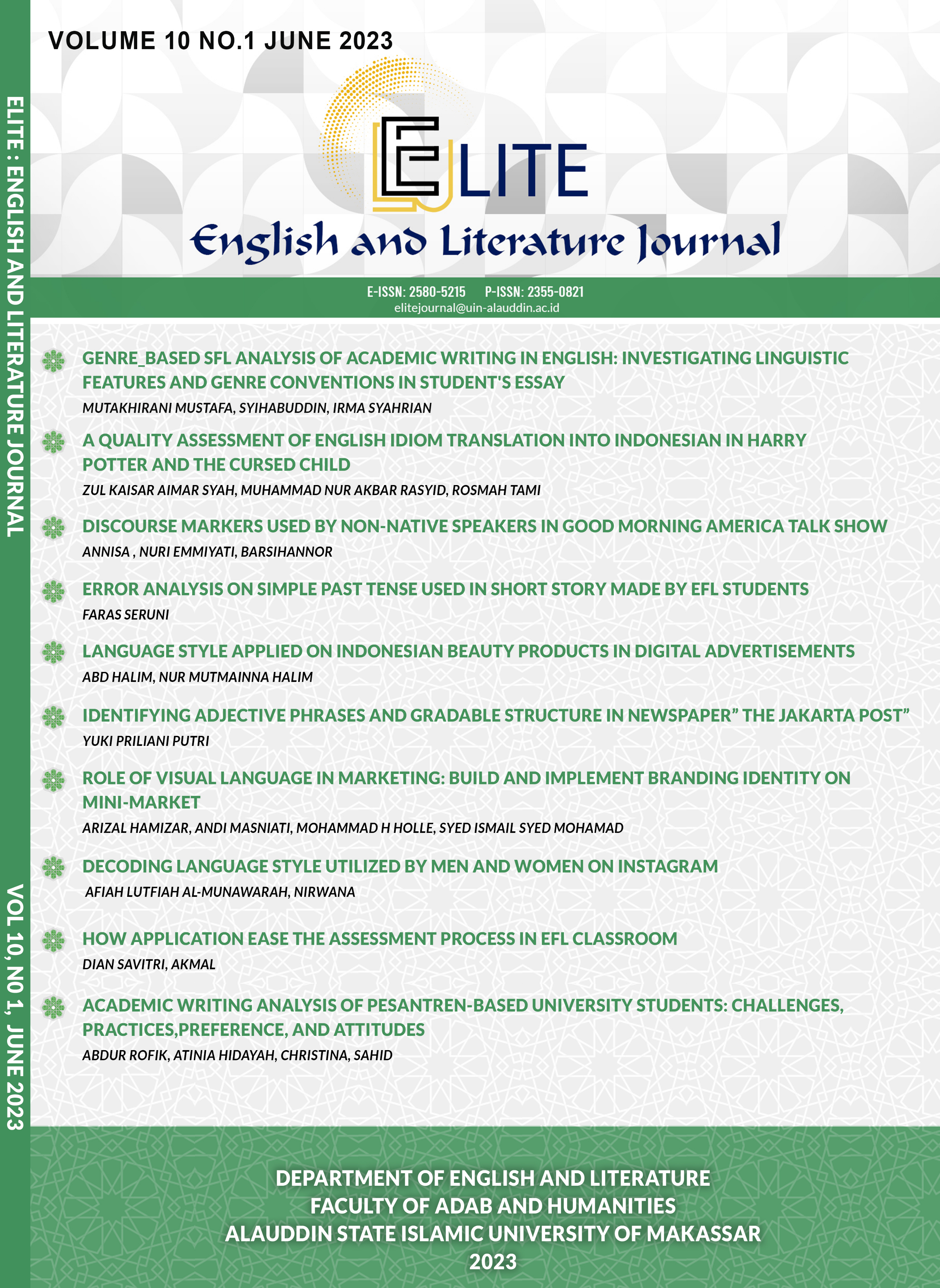Genre_Based SFL Analysis of Academic Writing in English: Investigating Linguistic Features and Genre Conventions in Student's Essay
Abstract
This study aims to conduct a genre-based and systemic functional linguistic (SFL) analysis of academic writing in higher education, with a focus on linguistic features and genre conventions in student essays. The research method used in this study is qualitative research. Specifically, the study uses a case study research design, where the focus is on a single limited case (in this case, student essays in academic writing in higher education). The research method involves collecting and analyzing data through a systematic and detailed examination of the linguistic features and genre conventions of student essays focus on how the students build the coherence and cohesion in academic writing. This research uses a genre-based approach to investigate how students use language to achieve communication goals in academic writing. The study utilizes corpus data from student essays to explore patterns and structures of academic discourse in various genres, as well as to identify linguistic features and coherence and cohesion that distinguish each genre and the researcher implemented interview to the students with six question related to the main research. The results of the study indicated that academic writing in higher education was characterized by a number of typical linguistic features in each genre, which were reflect different conventions and expectations in various academic genres. This study contributes to our understanding of how students use language to convey their ideas and arguments in various academic genres, as well as providing insights into the linguistic features and coherence and cohesion of writing that are important for successful academic writing in higher education.
Keywords: SFL, Linguistic Features, Coherence and Cohesion, Essays
Downloads
References
Accurso, K., & Gebhard, M. (2020). SFL praxis in the U.S. teacher education: a critical literature review. Language and Education, 0(0), 1–21. https://doi.org/10.1080/09500782.2020.1781880
Accurso, K., & Levasseur, J. (2022). Building Science Teacher Disciplinary Linguistic Knowledge with SFL (Issue November). Springer Nature Singapore. https://doi.org/10.1007/978-981-19-5351-4_5
Basmenj, H. B. (2020). Development of graduate students ’ academic writing abilities through genre-based instruction.
Cahyono, S. P. (2018). Teaching L2 writing through the use of Systemic Functional Linguistics (SFL). Indonesian JELT: Indonesian Journal of English Language Teaching, 13(1), 53–72. https://doi.org/10.25170/ijelt.v13i1.1450
CHEN, F. (2021). Exploring Students’ Perceptions and Attitudes towards Genre-based Pedagogy Developed in Persuasive Writing Teaching: The Systemic Functional Linguistics Perspective. Arab World English Journal, 12(4), 243–258. https://doi.org/10.24093/awej/vol12no4.17
Fitriana, W. (2021). Indonesian Journal of Functional Linguistics AN ANALYSIS OF STUDENT’S LITERARY RESPONSE TEXT USING SFL. Indonesian Journal of Functional Linguistics, 1(2), 99–108. https://doi.org/10.17509/ijsfl.v1i2.43980
Gardner, S. (2012). Genres and registers of student report writing: An SFL perspective on texts and practices. Journal of English for Academic Purposes, 11(1), 52–63. https://doi.org/10.1016/j.jeap.2011.11.002
Gebhard, M., Chen, I. A., & Britton, L. (2014). “Miss, nominalization is a nominalization:” English language learners’ use of SFL metalanguage and their literacy practices. Linguistics and Education, 26(1), 106–125. https://doi.org/10.1016/j.linged.2014.01.003
Kadwa, M. S., & Alshenqeeti, H. (2020). International Journal of Linguistics, Literature and Translation (IJLLT) The Impact of Students’ Proficiency in English on Science Courses in a Foundation Year Program. International Journal of Linguistics, Literature and Translation (IJLLT), 3(11), 55–67. https://doi.org/10.32996/ijllt
Kim, M. J. (2016). Metacognitive Genre Awareness as Cognitive Tool for Improving Expository Essay in EFL : Using SFL Genre Based Instruction. 1–78.
Moore, J. (2019). Choice and constraint: Using SFL genre theory to teach primary-grade students to write arguments about literature. Journal of Writing Research, 10(3), 429–464. https://doi.org/10.17239/jowr-2019.10.03.02
Risdianto, F., & Maret, U. S. (2022). Vol 11, No 2 (2018): REGISTER JOURNAL. 11(2).
Rodliyah, R. S., & Liani, A. E. (2022). SFL analysis: An investigation of students’ use of cohesive devices in exposition text. Indonesian Journal of Applied Linguistics, 12(1), 243–254. https://doi.org/10.17509/ijal.v12i1.46596
Zhang, T., & Zhang, L. J. (2021). Taking stock of a genre-based pedagogy: Sustaining the development of efl students’ knowledge of the elements in argumentation and writing improvement. Sustainability (Switzerland), 13(21). https://doi.org/10.3390/su132111616
Copyright (c) 2023 Mutakhirani Mustafa

This work is licensed under a Creative Commons Attribution-NonCommercial-ShareAlike 4.0 International License.
Once an article was published in the journal, the author(s) are:
granted to the journal right licensed under Creative Commons License Attribution that allows others to share the work with an acknowledgement of the work's authorship.
permitted to publish their work online in third parties as it can lead wider dissemination of the work.
continue to be the copyright owner and allow the journal to publish the article with the CC BY-NC-SA 4.0 license
receiving a DOI (Digital Object Identifier) of the work.


